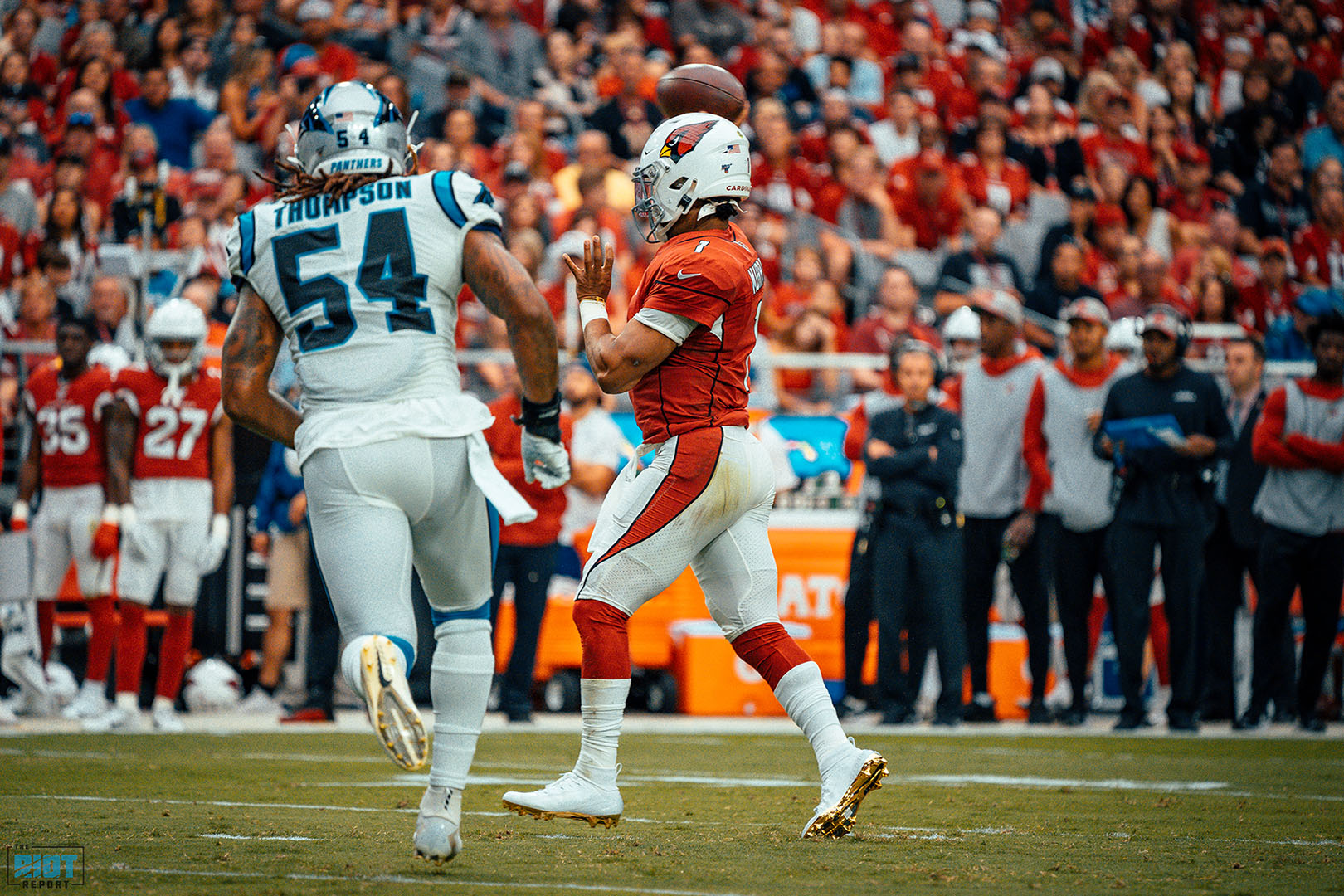Having finally managed to get their first win of the season against the Chargers last week, the Panthers will hope that they can turn the narrative of their season created after the first two weeks on its head this weekend when they face the Cardinals. While the Panthers are the underdogs entering the game, the Lions showed that this Cardinals team is beatable – with three weeks of data now available, the Panthers should have a much clearer idea of what their opponents strengths and weaknesses are than was possible for the first few games of the season.
So then, what do the Panthers need to do to beat the Cardinals?
Red Zone Frustrations
The Panthers enter the game against the Cardinals with the NFL’s 30th ranked red zone offense, converting on less than 40% of their trips – this was on clear display against the Chargers as the Panthers were repeatedly forced to settle for field goals after moving the ball well down the field. Conversely, the Cardinals enter the game with the NFL’s second-best red zone defense, allowing opponents to score on less than 31% of their trips to the red zone. Based on these stats alone, the Panthers might end up kicking a lot of field goals on Sunday = but what do they have to do in order to avoid this?
Well, for a start, they need to be able to run the ball more effectively.
This was something that Matt Rhule highlighted after the game; it was notably lacking on Sunday, outside of a couple of decent carries. Some of this lies with the offensive line of course, but some of the Panthers’ run designs, especially in the red zone, have been questionable and placed a lot on the shoulders of not just the offensive line but skill position players asked to block in and around the box. Being able to consistently get positive yardage will make a big difference, but especially in the red zone – where it can work to compact the defense laterally.
Additionally, the Panthers just need to be more aggressive at times – while Teddy Bridgewater has faced some criticism in this regard, the playcalling has often made it very hard for him to do much beyond throwing the ball short of the sticks. Joe Brady is still warming into the role as a full-time playcaller, but he needs to show that he can give his quarterback chances to throw the ball into the end zone more consistently.
Stop The Run
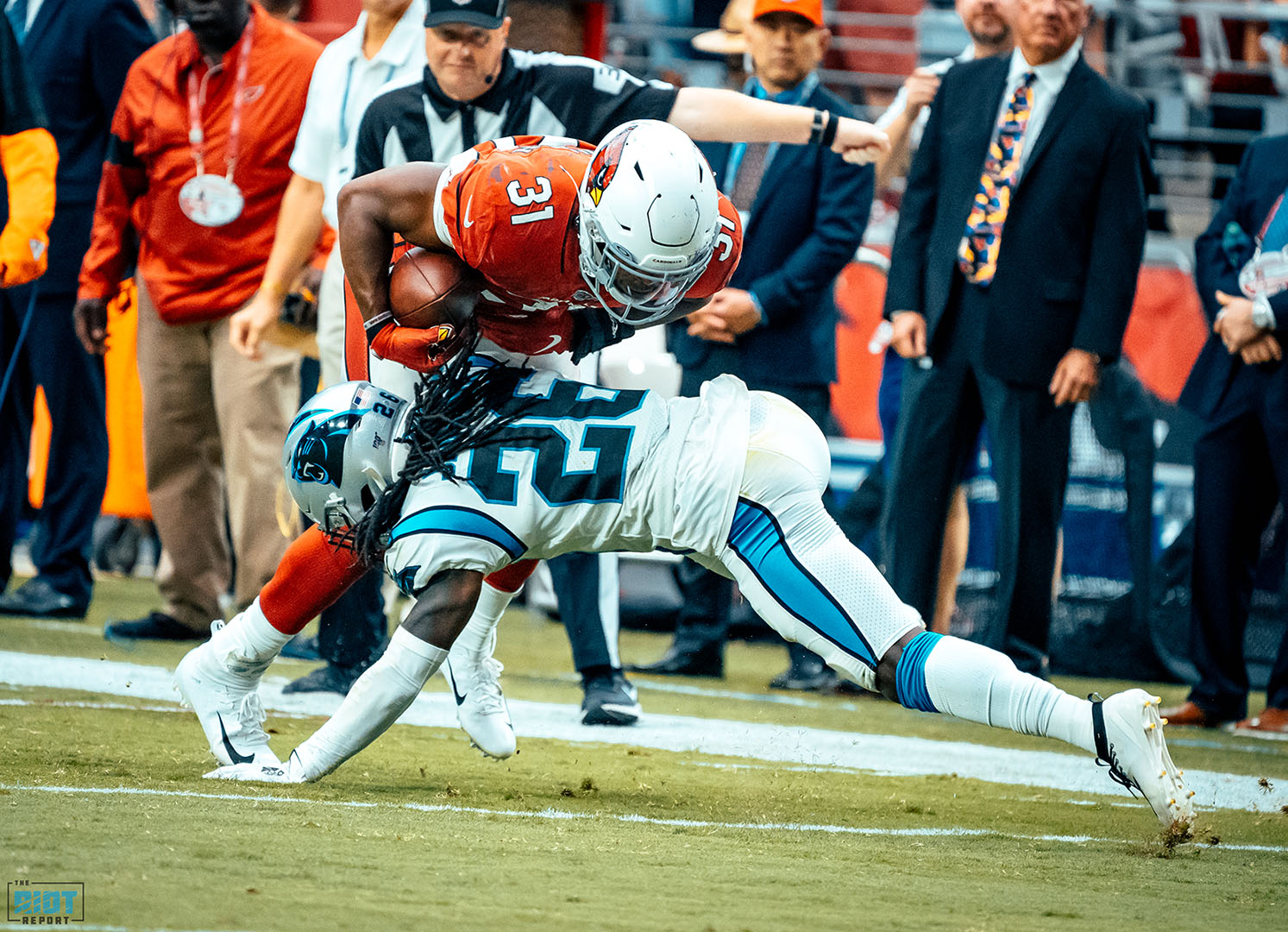
The Panthers are towards the middle of the pack in terms of run defense this season, a significant improvement on their historically poor run defense from a year ago; while they would certainly like to see their 4.9 yards-per-carry allowed decrease further as the season goes on, this is not the complete mess that some thought it might be given Phil Snow’s Big XII background.
However, the Cardinals enter the game with the NFL’s second-ranked rushing attack – a major part of this has been Kyler Murray, who is averaging over 60 yards per game on the ground at over seven yards per carry. If the Panthers can limit Kyler on the ground, they will still have to deal with the threat he poses through the air, but if they allow him to run all over them as well, it is hard to see how they can come away with a win.
Of course, while some of this comes down to the run defense and having a clear plan against any option attack they see – an area where Phil Snow’s Big XII background should come in handy – this will also have to be part of the consideration for the Panthers’ pass rush as well. Last year, the Panthers had a very productive day in terms of pass rush against Murray, but a lot of that came by forcing him to stay inside the pocket and keeping their rushers free to pressure him if he looked to break contain. While the Panthers have a lot of new pieces up front, they should look to use last year’s template as a guide for how to get pressure on Murray without giving him clear rushing lanes to break big plays with his legs.
The speed of Brian Burns in the open field especially should be a real weapon for the Panthers in this regard.
Offensive Line Permutations
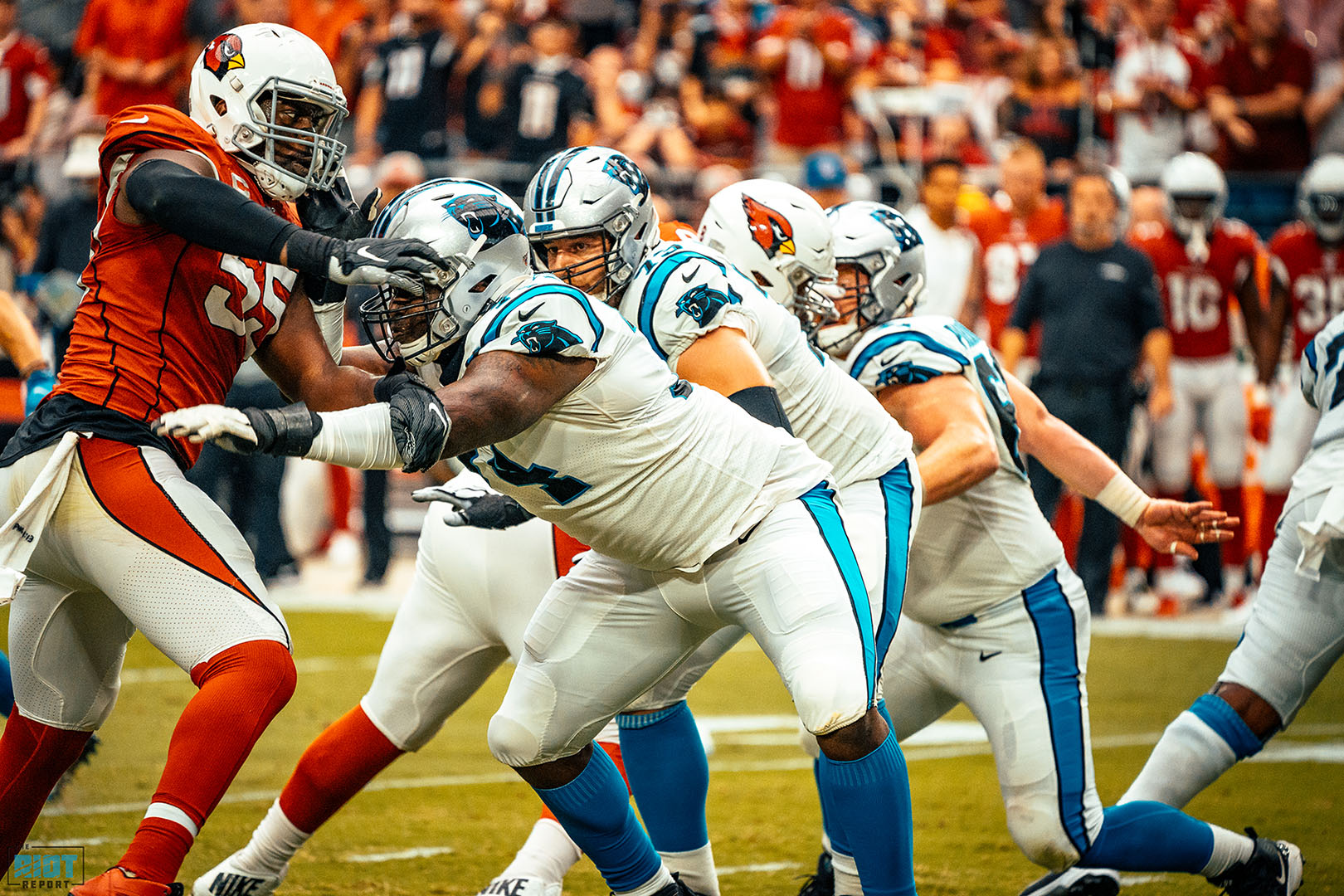
As of the time of writing, it is still unclear whether the Panthers will have one or both of Okung and Daley back for the game against the Cardinals. While it is worth noting that the Panthers should be much happier with the way that Chris Reed played against the Chargers than Michael Schofield’s performances through the first two weeks, getting a player like Daley back would be hugely beneficial. Not only does he have the athleticism to deal with the speed and power of the Cardinals’ defensive front in pass protection, but he is also a very good run blocker, who has the power to move people at the point of attack and the movement skills to offer value out in space as a pulling blocker as well.
While Okung is in a very different place in his career than Daley, his return would certainly offer the Panthers some solidity on the left side – while he didn’t look like he was about to see an All-Pro rejuvenation through the first two weeks, he looked very much the part of an NFL left tackle.
If Okung isn’t able to go, however, the Panthers really need to do away with the rotation they tried against the Chargers – this makes it very hard for the offensive line to gel and causes issues for the players who have to repeatedly get themselves back into the game. Based on what we saw against the Chargers, and despite some frustrating mental errors, it is hard to argue from the tape that the Panthers shouldn’t continue with Greg Little in Okung’s absence. Trent Scott did have some nice plays as a run blocker, but his limitations in pass protection were evident and the Chargers clearly looked to exploit this late in the game, ultimately resulting in the third down sack that ended the Panthers’ final drive.
Keep The Turnovers Coming
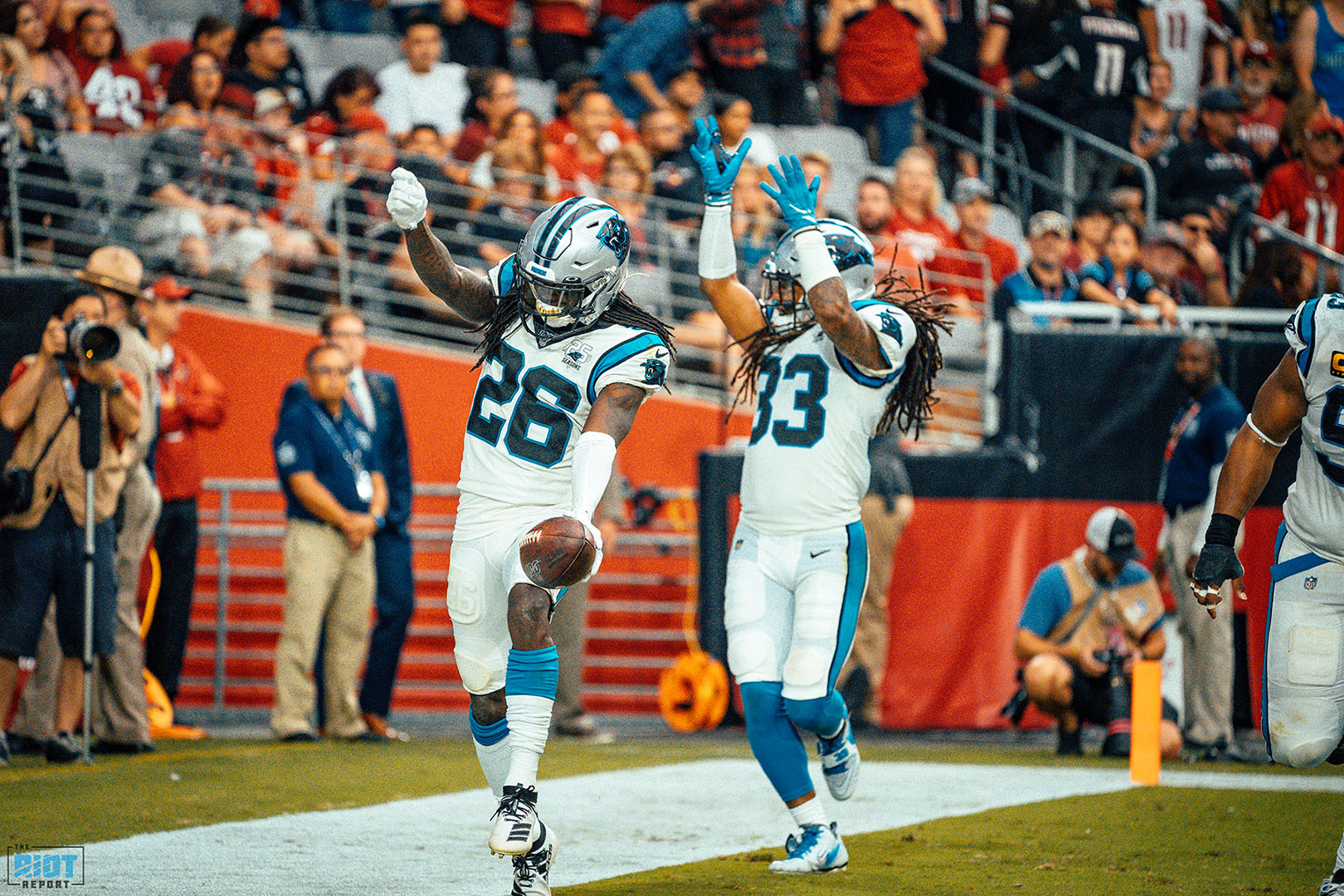
Pick #2 for Donte Jackson in 2019
Despite being one of the most productive passing offenses in the NFL, the Cardinals passing attack as a whole has been somewhat disappointing so far this season – in no small part because of their poor interception percentage of 4.4%, third-worst in the NFL behind only the Eagles and the Vikings. They have also coughed up a few fumbles as well – these two factors combined mean they have allowed five turnovers, sixth-worst in the NFL.
While the Panthers have surrendered quite a lot of yards on defense through three games, they have been able to compensate for that with a high number of turnovers with six, good for third in the NFL. The combinations of these factors mean that the Panthers should hope to be able to generate more turnovers this weekend – given how effectively the Cardinals can move the ball, they will probably need to do so in order to prevent the offense from having to chase the score.
On the other side of the ball, the Cardinals are yet to force an interception thus far this season, one of only three teams to have failed to do so, and while they have forced two fumbles, they still rank 31st in the NFL in terms of forced turnovers. The Panthers are towards the middle of the pack in terms of turnovers allowed with four, similar to their interception percentage of just under two. While a lot of this was the sloppy offensive performance against the Bucs, they cannot afford to have a similar game and make things easy for a Cardinals’ defense that has struggled to generate turnovers.
Teams often talk about how winning the turnover battle is a good indicator for success, but this week the Panthers should see this as more of a requirement than a positive. If they turn the ball over more than the Cardinals, all signs point to them having a very long afternoon – but if they are able to win the turnover battle, they are in with a chance.
Offense Needs To Find Another Gear
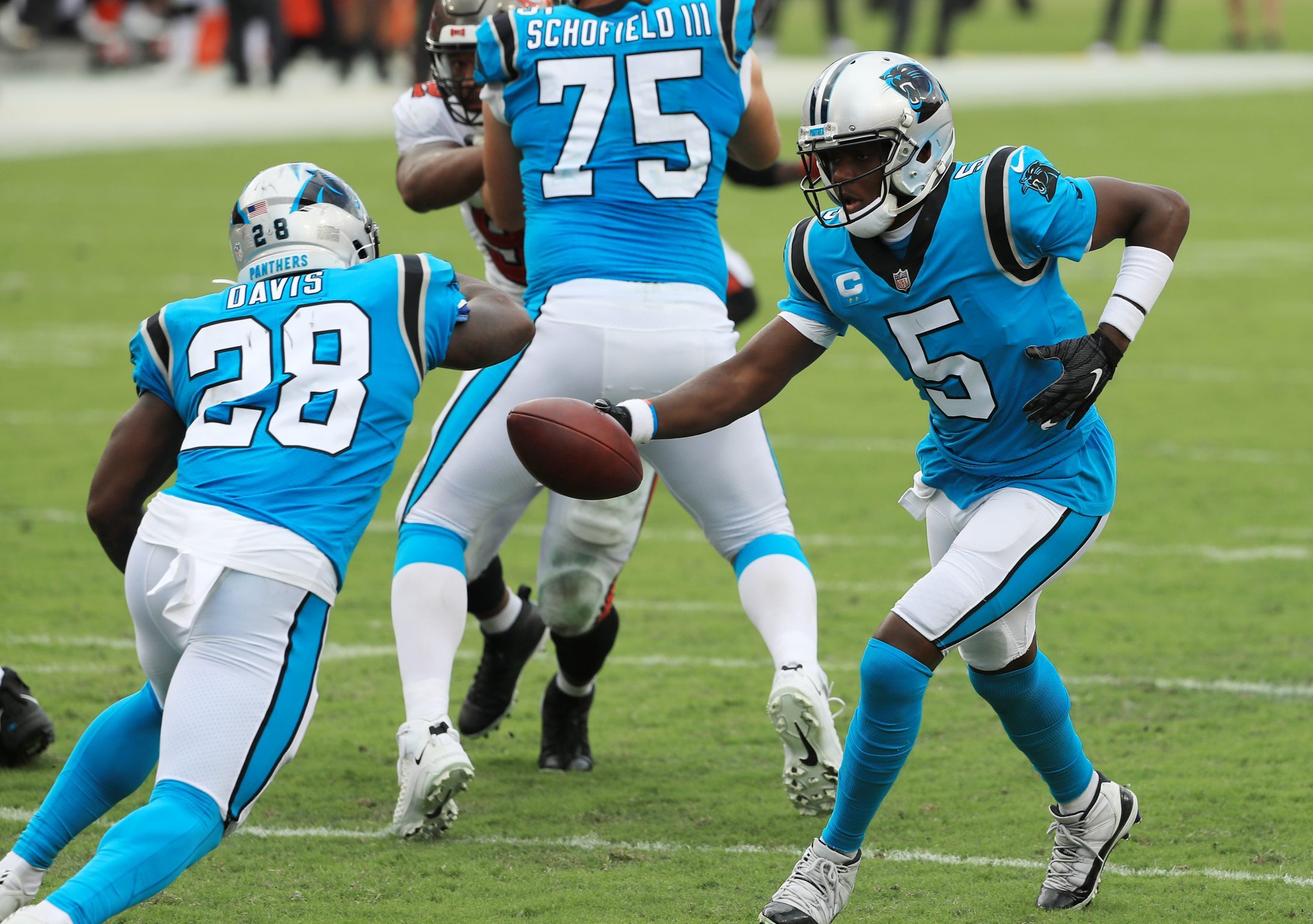
Photo Credit: Getty Images
Going into the season, the expectation for the Panthers was that the defense was going to concede a lot of points, but the offense was going to score quite a few in return. The opening game against the Raiders, while a little rusty for understandable reasons, seemed to be a good example of this – since then, this Panthers offense hasn’t really provided quite the same explosivity that many were expecting.
They are completing an extremely impressive 74% of their passes, good for third in the NFL, but their yards-per-completion is towards the middle of the pack, meaning they rank sixth in yards-per-attempt. Now, don’t get me wrong, those are still pretty good metrics, but where the Panthers having been so impressive is when it comes to metrics such as Adjusted Net Yards Per Attempt – where they rank 15th in the NFL – or third down percentage – where they rank 14th at just under 45%.
Of course, being average isn’t bad, but when you have invested heavily in the wide receiver position and have a young exciting tight end and nearly two games of the best and most versatile running back in football, these numbers are just a tad disappointing.
It would be completely unfair to say that the Panthers’ passing attack has been bad, just maybe a little more pedestrian than many hoped. Joe Brady is still very much new to the role of offensive coordinator; so this offense should be given some time to find that next gear – but through three games, there has been less to get excited about than was hoped for when the Panthers were taking shape over the offseason. The Cardinals 13th-ranked pass defense won’t be a walkover in this regard, but it would be nice to see the Panthers making more of their skill position talent outside of Robby Anderson on Sunday.
This is a game the Panthers can win, but probably shouldn’t be expected to.
If they are able to come away with a W, then conversations about playoffs really won’t be that far-fetched, but if they lose, this shouldn’t be some crushing blow for the new regime. This game is a good test, one young and developing team against a similar team but maybe one year ahead in its evolution. But then again, not everybody grows at the same pace – the Panthers will hope to show they are moving forwards at warp speed and look to knock off one of the NFL’s up-and-coming teams.

